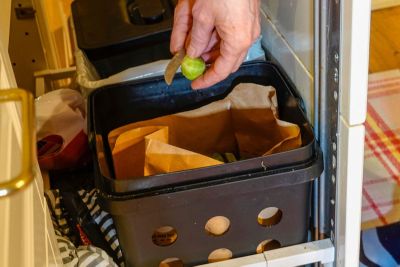Making Compost in a Small Space
Apartment and condo dwellers may want to try composting indoors but worry about the smell. There are actually new methods that do not create an odor and result in wonderful houseplant soil. Urban composting is often supported by municipal waste collection or private companies, but you can set up your own system at home and create a little black gold for your own use as well. In areas without compost services, you can still turn your kitchen scraps into compost. One of the simplest methods is to make a worm bin. This is just a plastic container with drainage and air holes punched into the top and bottom. Then place a generous layer of shredded newspaper, red wiggler worms, and kitchen scraps. Overtime, the worms release castings which are nutritious plant food. You can also buy vermicomposting systems. If you don’t want to mess with worms, try composting indoors with bokashi. This is a method where you can compost any organic item, even meat and bones. Just throw all your food garbage into a bin and add a microbe rich activator. This ferments the food and will break it down in about a month.
Can You Compost on a Balcony?
Urban composting just needs a small space. You need a container, kitchen scraps, and a water mister to keep things lightly moist. Set the container outside and add your organic waste. A compost starter is helpful but not necessary, as is some garden dirt that has the basic aerobic life needed to start the break down process. Most important is to turn the budding new compost and keep it lightly moist. Using a two bin or container system will allow you to have one finished product while the other container is in operation.
Other Ways of Composting in an Apartment
If you want to make compost in a small space, you might try an electric composter. All you need is a little counter space and these new gadgets will turn your food waste into dark, rich soil. They may also be sold as food recyclers or electric compost bins. They can break down food in just five hours by drying and heating, then grinding the food and finally cooling it for use. All associated odors are caught in carbon filters. If you can’t afford this method and don’t have time for the others, consider taking your kitchen scraps to a community garden or find someone with chickens. That way some use will come out of your garbage, and you can still be an environmental hero.
